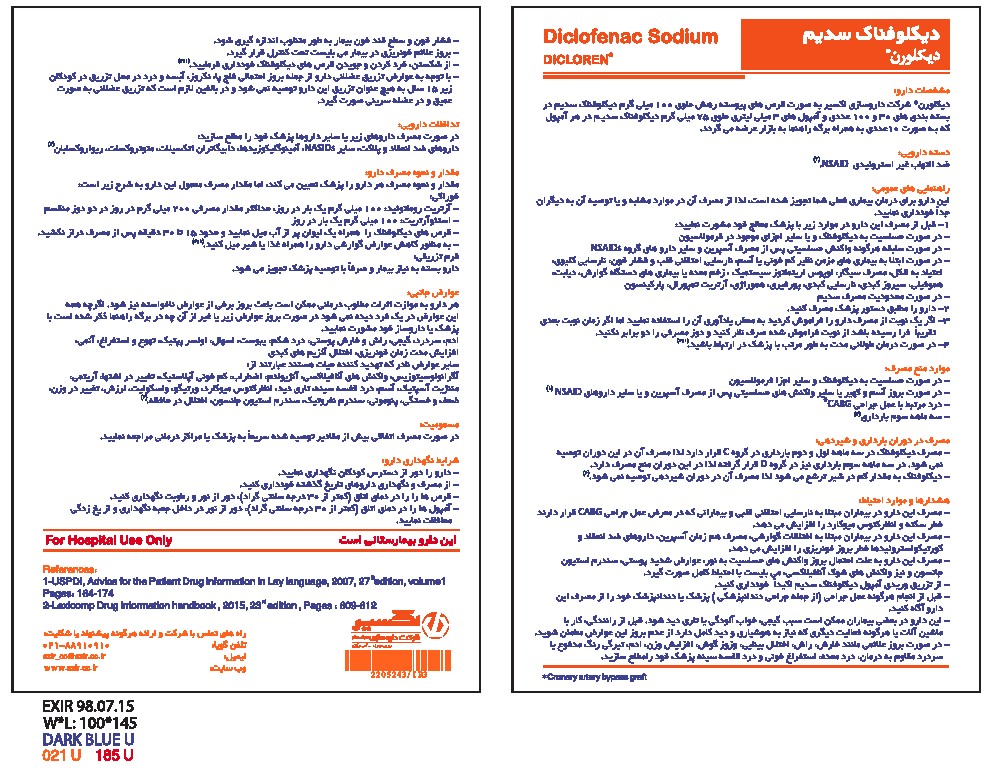DICLOREN ER 100mg E.R.
tablet Diclofenac Sodium 100mg

| Generic Name of Product | Brand Name | Dosage Form | Strength | Pharmacologic Group | Therapeutic Group | Unit Per Pack |
| Diclofenac | Dicloren® | E.R.Tablet | 100 mg | NSAIDs | Analgesics | 100 |
Indications And Usage | For relief of signs and symptoms of osteoarthritis For relief of signs and symptoms of rheumatoid arthritis |
Administration | For the relief of osteoarthritis, the recommended dosage is 100 mg q.d. For the relief of rheumatoid arthritis, the recommended dosage is 100 mg q.d. In the rare patient where Dicloren 100 mg/day is unsatisfactory, the dose may be increased to 100 mg b.i.d. if the benefits outweigh the clinical risks of increased side effects. |
Contraindications | Dicloren tablets are contraindicated in patients with known hypersensitivity to diclofenac. Dicloren should not be given to patients who have experienced asthma, urticaria, or other allergic-type reactions after taking aspirin or other NSAIDs. Severe, rarely fatal, anaphylactic-like reactions to NSAIDs have been reported in such patients |
Precautions | Dicloren cannot be expected to substitute for corticosteroids or to treat corticosteroid insufficiency. Abrupt discontinuation of corticosteroids may lead to disease exacerbation. Patients on prolonged corticosteroid therapy should have their therapy tapered slowly if a decision is made to discontinue corticosteroids.The pharmacological activity of Dicloren in reducing fever and inflammation may diminish the utility of these diagnostic signs in detecting complications of presumed noninfectious, painful conditions. |
Adverse Reactions | In patients taking Dicloren tablets, or other NSAIDs, the most frequently reported adverse experiences occurring in approximately 1%-10% of patients are: Gastrointestinal experiences including: abdominal pain, constipation, diarrhea, dyspepsia, flatulence, gross bleeding/perforation, heartburn, nausea, GI ulcers (gastric/duodenal) and vomiting. Abnormal renal function, anemia, dizziness, edema, elevated liver enzymes, headaches, increased bleeding time, pruritus, rashes and tinnitus. |
Pregnancy and lactation | Pregnancy Dicloren should only be used during pregnancy when your doctor decides the benefits to you are greater than any possible risk to the unborn baby. Do not take Dicloren during the last 3 months of pregnancy as it may affect your baby’s circulation and kidneys. |
Renal and liver Impairment | Long-term administration of NSAIDs has resulted in renal papillary necrosis and other renal injury. Renal toxicity has also been seen in patients in whom renal prostaglandins have a compensatory role in the maintenance of renal perfusion. Patients at greatest risk of this reaction are those with impaired renal function, heart failure, liver dysfunction, those taking diuretics and ACE inhibitors, and the elderly. Discontinuation of NSAID therapy is usually followed by recovery to the pretreatment state. |
Laboratory Tests | Because serious GI tract ulcerations and bleeding can occur without warning symptoms, physicians should monitor for signs or symptoms of GI bleeding. In patients on long-term treatment with NSAIDs, including Dicloren, the CBC and a chemistry profile (including transaminase levels) should be checked periodically. If clinical signs and symptoms consistent with liver or renal disease develop, systemic manifestations occur (e.g., eosinophilia, rash, etc.) or if abnormal liver tests persist or worsen, Dicloren should be discontinued. |

